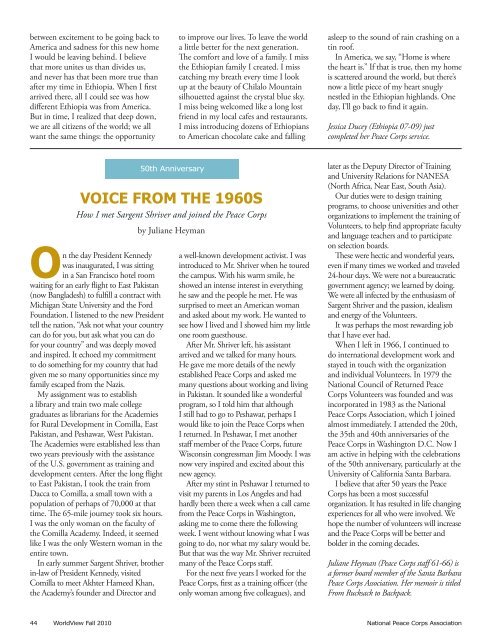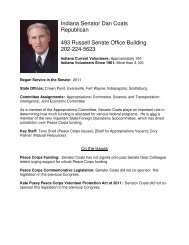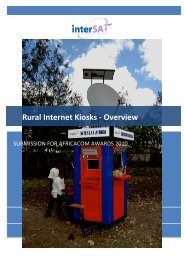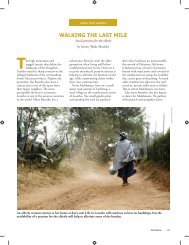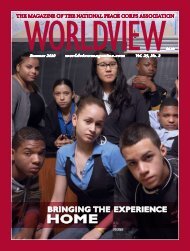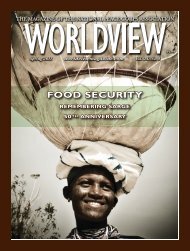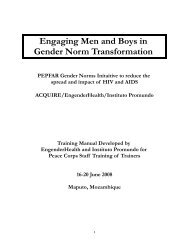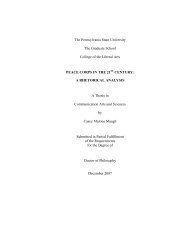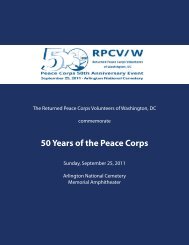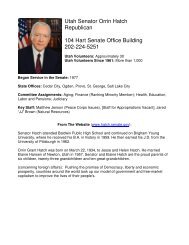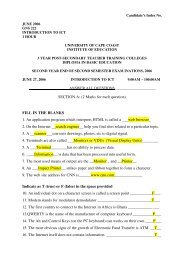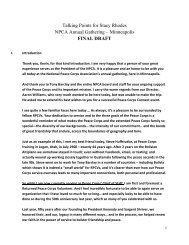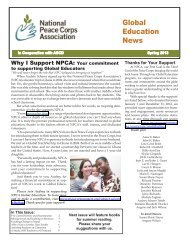Fall 2010 - National Peace Corps Association
Fall 2010 - National Peace Corps Association
Fall 2010 - National Peace Corps Association
- No tags were found...
Create successful ePaper yourself
Turn your PDF publications into a flip-book with our unique Google optimized e-Paper software.
etween excitement to be going back toAmerica and sadness for this new homeI would be leaving behind. I believethat more unites us than divides us,and never has that been more true thanafter my time in Ethiopia. When I firstarrived there, all I could see was howdifferent Ethiopia was from America.But in time, I realized that deep down,we are all citizens of the world; we allwant the same things: the opportunityto improve our lives. To leave the worlda little better for the next generation.The comfort and love of a family. I missthe Ethiopian family I created. I misscatching my breath every time I lookup at the beauty of Chilalo Mountainsilhouetted against the crystal blue sky.I miss being welcomed like a long lostfriend in my local cafes and restaurants.I miss introducing dozens of Ethiopiansto American chocolate cake and fallingasleep to the sound of rain crashing on atin roof.In America, we say, “Home is wherethe heart is.” If that is true, then my homeis scattered around the world, but there’snow a little piece of my heart snuglynestled in the Ethiopian highlands. Oneday, I’ll go back to find it again.Jessica Ducey (Ethiopia 07-09) justcompleted her <strong>Peace</strong> <strong>Corps</strong> service.On the day President Kennedywas inaugurated, I was sittingin a San Francisco hotel roomwaiting for an early flight to East Pakistan(now Bangladesh) to fulfill a contract withMichigan State University and the FordFoundation. I listened to the new Presidenttell the nation, “Ask not what your countrycan do for you, but ask what you can dofor your country” and was deeply movedand inspired. It echoed my commitmentto do something for my country that hadgiven me so many opportunities since myfamily escaped from the Nazis.My assignment was to establisha library and train two male collegegraduates as librarians for the Academiesfor Rural Development in Comilla, EastPakistan, and Peshawar, West Pakistan.The Academies were established less thantwo years previously with the assistanceof the U.S. government as training anddevelopment centers. After the long flightto East Pakistan, I took the train fromDacca to Comilla, a small town with apopulation of perhaps of 70,000 at thattime. The 65-mile journey took six hours.I was the only woman on the faculty ofthe Comilla Academy. Indeed, it seemedlike I was the only Western woman in theentire town.In early summer Sargent Shriver, brotherin-law of President Kennedy, visitedComilla to meet Akhter Hameed Khan,the Academy’s founder and Director and50th AnniversaryVoice from the 1960sHow I met Sargent Shriver and joined the <strong>Peace</strong> <strong>Corps</strong>by Juliane Heymana well-known development activist. I wasintroduced to Mr. Shriver when he touredthe campus. With his warm smile, heshowed an intense interest in everythinghe saw and the people he met. He wassurprised to meet an American womanand asked about my work. He wanted tosee how I lived and I showed him my littleone room guesthouse.After Mr. Shriver left, his assistantarrived and we talked for many hours.He gave me more details of the newlyestablished <strong>Peace</strong> <strong>Corps</strong> and asked memany questions about working and livingin Pakistan. It sounded like a wonderfulprogram, so I told him that althoughI still had to go to Peshawar, perhaps Iwould like to join the <strong>Peace</strong> <strong>Corps</strong> whenI returned. In Peshawar, I met anotherstaff member of the <strong>Peace</strong> <strong>Corps</strong>, futureWisconsin congressman Jim Moody. I wasnow very inspired and excited about thisnew agency.After my stint in Peshawar I returned tovisit my parents in Los Angeles and hadhardly been there a week when a call camefrom the <strong>Peace</strong> <strong>Corps</strong> in Washington,asking me to come there the followingweek. I went without knowing what I wasgoing to do, nor what my salary would be.But that was the way Mr. Shriver recruitedmany of the <strong>Peace</strong> <strong>Corps</strong> staff.For the next five years I worked for the<strong>Peace</strong> <strong>Corps</strong>, first as a training officer (theonly woman among five colleagues), andlater as the Deputy Director of Trainingand University Relations for NANESA(North Africa, Near East, South Asia).Our duties were to design trainingprograms, to choose universities and otherorganizations to implement the training ofVolunteers, to help find appropriate facultyand language teachers and to participateon selection boards.These were hectic and wonderful years,even if many times we worked and traveled24-hour days. We were not a bureaucraticgovernment agency; we learned by doing.We were all infected by the enthusiasm ofSargent Shriver and the passion, idealismand energy of the Volunteers.It was perhaps the most rewarding jobthat I have ever had.When I left in 1966, I continued todo international development work andstayed in touch with the organizationand individual Volunteers. In 1979 the<strong>National</strong> Council of Returned <strong>Peace</strong><strong>Corps</strong> Volunteers was founded and wasincorporated in 1983 as the <strong>National</strong><strong>Peace</strong> <strong>Corps</strong> <strong>Association</strong>, which I joinedalmost immediately. I attended the 20th,the 35th and 40th anniversaries of the<strong>Peace</strong> <strong>Corps</strong> in Washington D.C. Now Iam active in helping with the celebrationsof the 50th anniversary, particularly at theUniversity of California Santa Barbara.I believe that after 50 years the <strong>Peace</strong><strong>Corps</strong> has been a most successfulorganization. It has resulted in life changingexperiences for all who were involved. Wehope the number of volunteers will increaseand the <strong>Peace</strong> <strong>Corps</strong> will be better andbolder in the coming decades.Juliane Heyman (<strong>Peace</strong> <strong>Corps</strong> staff 61-66) isa former board member of the Santa Barbara<strong>Peace</strong> <strong>Corps</strong> <strong>Association</strong>. Her memoir is titledFrom Rucksack to Backpack.44 WorldView <strong>Fall</strong> <strong>2010</strong> <strong>National</strong> <strong>Peace</strong> <strong>Corps</strong> <strong>Association</strong>


